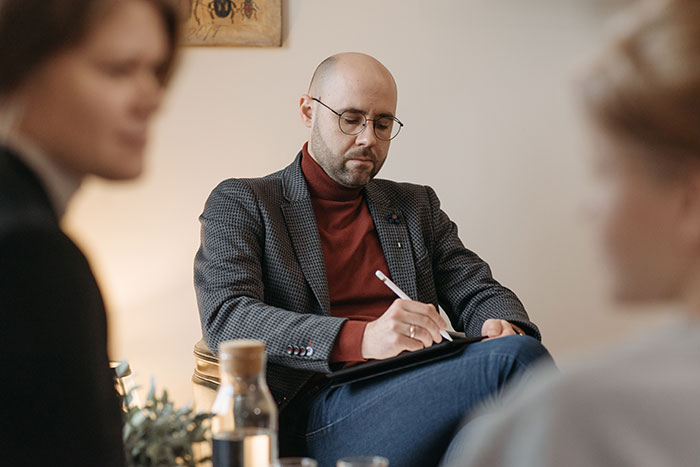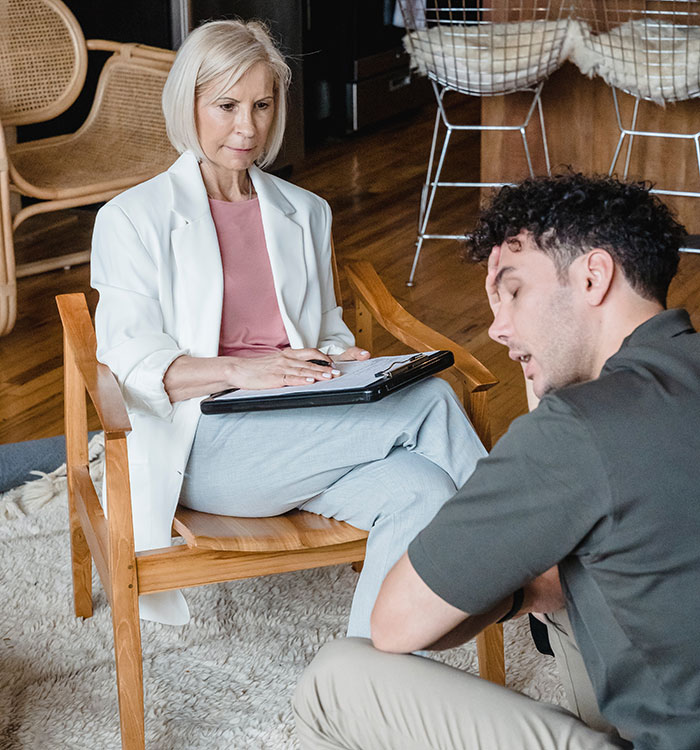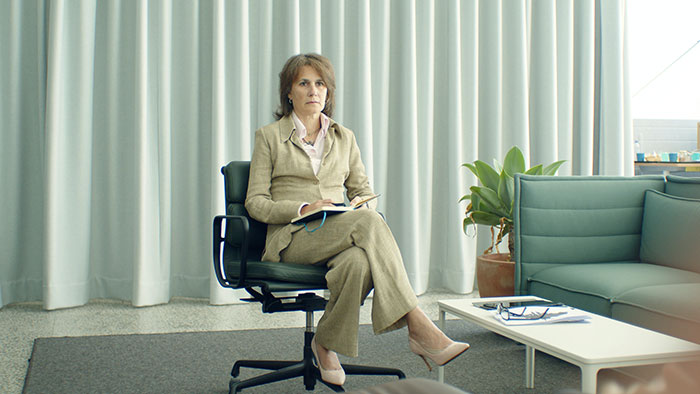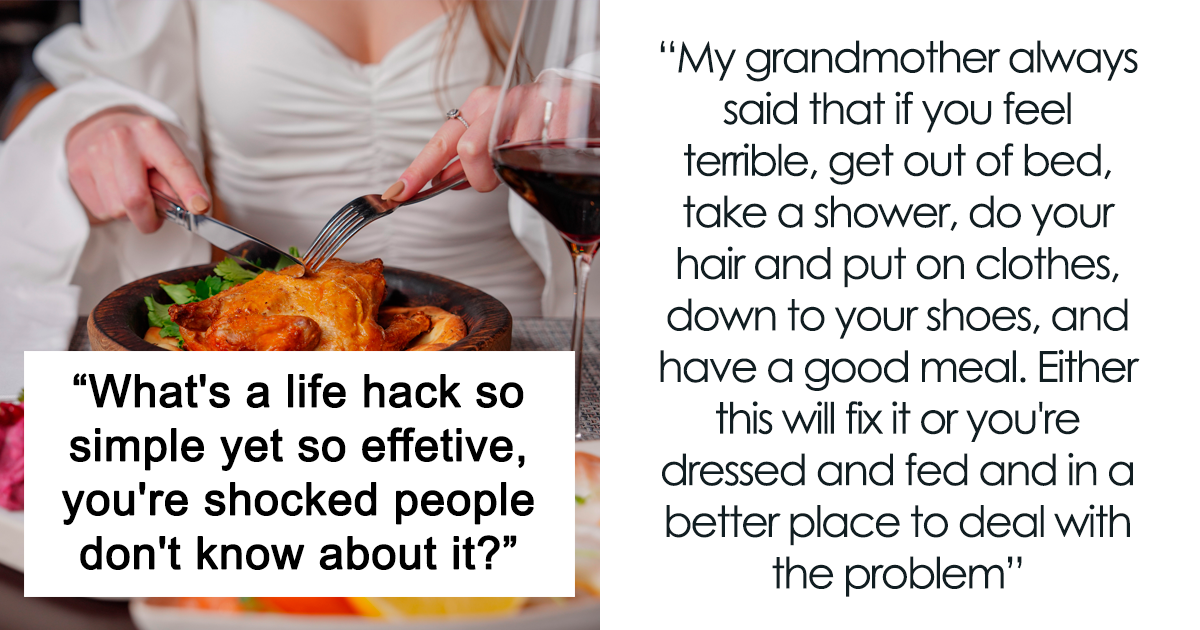Relationships are a lot of hard work! You need proper communication, lots of patience, and tons of respect for one another if you plan on making things work in the long term. However, there are times when folks can’t seem to work out their differences and argue constantly. That’s when some of them might reach out to couples therapists or marriage counselors for help.
Though these professionals help many of their clients, some of them seem nearly beyond their aid. Bored Panda has collected some of the most open and honest therapists’ posts on Reddit about how they handle cases when couples have deeply troubled relationships that they might feel won’t last. Scroll down for their stories.
- Read More: 30 Therapists Share Moments They Realized Relationships Were Not Going To Work And What They Did
#1
I would note that in my training we are taught that it is unethical to continue couple's therapy with a relationship where one partner is abusing the other. My SIL and her former husband were in this situation (he was/is abusive) - their therapist basically told her that he couldn't continue working with them because her husband was abusive and she should leave him. I give a lot of props to that therapist since this was in a highly conservative/religious area where divorce is really frowned upon, and this was a specifically religious therapist.
Image credits: plant_psychologist
#2
Not a therapist here, but training to be one.My professor was a couples therapist for 25 years. She said on the first session she would take each person in her office separately and ask them "on a scale of 1 to 10, how much do you want to work on this relationship and stay together?"
She said that she could construct a treatment plan based on where the numbers were relative to each other. So her plan would look different if a couple answered like 8&9 than if they looked like 1&2. She said the saddest were when it was like 1&10 because then it was more about helping that person who was a 10 slowly accept that things weren't going to work out.

Image credits: anon
#3
In all my years of marriage counseling, I’ve realized the one sign that a couple won’t make it. They show contempt for each other. Not even hatred or anger, just disdain. Eg eye-rolling, diminishing one another’s points etc.
Image credits: 19mcmant
#4
Therapist here... In my experience strong healthy relationships are built on two very important qualities: trust and respect. Love is not included in these qualities because love is not a determiner of a strong/healthy relationship.Dysfunctional relationships are still possible among people who love each other. And loving someone isn't the only reason to stay with a person. Many of the clients that I've worked with in the past who are in very dysfunctional relationships have actually stayed solely because of love, but continue to struggle in those relationships because they lack trust and respect.
Without respect and trust most relationships are doomed to struggle or fail. For the couples that I've worked with I always assess for whether or not trust and respect is present. And then build treatment goals around seeing if it possible to develope those qualities. If they are not willing or able, then in most cases those relationships are likely to end.

Image credits: sparky32383
#5
Not personally, but I did have a professor tell a story of doing this in a single session.Basically when he was working as a couples therapist he had one couple who came in for their very first session and the wife immediately starts going off on him. She tells the therapist that the relationship is never going to work, she wants to break up, and the only reason she was there was because her husband insisted. The husband, meanwhile, sits there quietly for thirty minutes while the wife explains all the reasons she can't stand him anymore.
Eventually the therapist leans back and says something to the effect of: "You're right. If you don't want to be in the relationship there's nothing I can do, nor do I think I should try to talk you out of it. If you don't want therapy, maybe you would be better off apart."
Apparently she looked incredulous and they got up and left. The ridiculous part is that she apparently called the therapist about a half hour after that screaming, saying what a bad therapist he was and how they were going to prove him wrong and make things work. Apparently all she needed to want to make an effort was to be told she couldn't do it. People are funny sometimes.

Image credits: Elementatrion
#6
My cousin is a marriage counselor, and she said that most couples visiting her have one person who is trying to rebuild the relationship, and the other one has already mentally packed up and left. The sessions usually turn into grief counseling for the one who hasn't figured out it's over already.
Image credits: YesRocketScience
#7
Met a couple where the husband constantly disparaged his wife. It was just pure toxic. I had to tell them to consider alternative options.
Image credits: chooselife123321
#8
Therapist here. I have a lot more experience with family therapy as opposed to just strictly seeing couples.Generally it wouldn’t be appropriate to tell a client what to do, especially with an enormous life decision like divorce. I did see a couple where I thought it was very unlikely that they’d be able to reconcile because they would not put aside their need to hurt each other emotionally in order to do the necessary work to repair their marriage. Plus the wife had disclosed to me that she only was staying in the marriage out of guilt and was miserable.
I might ask questions like, “do you feel like living this way is sustainable?” etc, to get the gears turning. Generally I help people feel more confident about how they’re already feeling/what they already want to do.

Image credits: dirtyberti
#9
Most depressing thing I ever heard from my friend who is a couples therapist is that the relationships hardly ever work out because it's usually too late by the time they are seeking therapy.
Image credits: Siriusly_Absurd
#10
More often than you'd think, people come into marriage counseling after they've already decided their marriage is over. Often, people feel pressured to "try to fix it" by doing professional couples work, when in reality they're just doing it so they can look back after the divorce and be able to say they've done everything they could. If I get that sense, I often ask them if I'm there to help them repair their marriage, or if my job will be to facilitate a healthy divorce process or co-parenting plan. Many couples seem relieved when this comes up, as pretending to do the work of couples therapy is, in that case, just delaying the inevitable.Edit- also, it's extremely unethical to continue to provide services that will not be of a benefit to them. So, the thought process OP describes would be a terrible example of a therapist. Referring cases to someone else or simply saying, "I can't help and here's why.." is more than okay.

Image credits: ItsStillaTrap
#11
I saw a couple that was doing "retaliatory" cheating (and telling each other about it). When they got through their anger, they decided to call a truce and made peace. With their level of emotional maturity, I doubt it lasted. I don't know if I helped them or prolonged their suffering. It was their decision to come to counseling, so I think it was the help they wanted.Other clients realize what they really want is "divorce counselling". What's the best way to behave civilly and minimize damage to the kids while we go our separate ways?

Image credits: lightspeeed
#12
Active independence from each other is my #1 sign of “this marriage is about to spiral downward”. As soon as I realize a couple is doing things separately, like applying for car loath without the others knowledge, or planning personal trips without consulting the other, I know that the couple is soon doomed.
Image credits: Mattrockj
#13
At the first session, I explain to both partners the goal of therapy is not to keep them together. The goal is to help them improve how they communicate with each other to resolve conflict and/or differences. No guarantee of the outcome. If they decide to end the relationship, at least they can be civil about it and communicate respectfully, honestly, and in ways they feel good about themselves. When I have been directly asked my opinion about a couple staying together, I usually ask if the one person can (1) imagine their future without the other and (2) look past and/or accept the [fill in the blank] because the relationship is worth it or the person has more positive qualities. I have talked to individual clients about why they should end their relationship, especially if it is abusive or toxic, but usually I try to help the individual look at pros/cons of staying and identify consequences for choices.
Image credits: lori1119
#14
It depends on the situation, but I generally do not tell people to split. I explore the relationship and see if this is the kind of relationship the client likes or wants. We'll then compare and contrast the two relationship types and explore how to either 1) make the relationship fit or 2) change relationships.The reason it depends? Abusive relationships. They tend to require a different approach. You can't sit and watch your client being beaten while you process through positive and negative relationships. You have to be a little more proactive when safety is involved.
For me, generally "This is a bad relationship you don't need" comes after the client identifies the relationship isn't one they need. It's used as a confirmation instead of a demand.

Image credits: sordidbabble
#15
As a therapist it’s not my place to try to get them to reunify...that takes their power and gives it to me instead of me teaching them skills to make their own informed decision. That being said, whenever one half of the couple comes in and says they’re there because their spouse made them come, it’s pretty rare that they decide to stay together.
Image credits: Kfaith629
#16
All relationships are "resolvable" until one party decides they won’t put in the effort. These people are fairly easy to spot, even at the beginning. Still, humans have a great capacity for change and surprises do occur.
Image credits: [deleted] ·
#17
I try not to think of this issue in terms of "can I help them" as much as "will they do what is necessary to repair this relationship." It is often immediately clear that discrepancies exist in motivation, and this usually holds true upon further assessment. Here are the couples I see that I'm less optimistic about:Couples who refuse to participate in counseling. I give all kinds of homework, usually related to enhancing communication and building connection. Couples who come back after the first few sessions and report zero effort to do any homework (and not just my homework, but things that would serve the same purpose) are usually couples who have checked out.
Heterosexual couples where men refuse to accept that their female partners have anything valuable to say.
Couples who want me to be a referee.
Couples where one partner "just knows that so-and-so is cheating and why wont they just admit it already."
Fighting I can handle. Intimacy issues I can handle. But folks that want me to wave a magic wand and fix their marriage, folks who are trapped in an ideological box that tells them they don't need to do any work, are usually not ready for help.

Image credits: finefinefine
#18
I'm not technically licensed yet, but I'm practicing as a couples therapist. My own personal belief is that I don't know if a couple can make it or not. There are tons of different kinds of marriages, and people get really creative at making it work.I've only been at it a year, but I've seen some pretty amazing things, including couples on the brink of divorce getting back to where they used to be, and some pretty sexist husbands start to realize that maybe women are worth respecting. Its taught me to not give up hope.
That said, I won't help couples who are actively violent- especially if there's power involved (ie, only one of the partners is violent towards the other, rather than both get physical with each other). For that, I suggest they separate until the violent one can get some coping skills and be safe.

Image credits: SeoidsGem
#19
Former therapist. There is no such thing as being right for each other.Any two people can make a positive life together if they so choose. However, communication, understanding, and acceptance play huge roles in that.
At times, it becomes pretty clear either one or both partners aren’t willing to compromise or come together on certain issues.
But to answer your question. I’ve never gone out and said it because a good therapist shouldn’t. But i have said that things needs to be addressed and both need to take a more active role in their marriage/relationship otherwise it is bound to fail.

Image credits: [deleted]
#20
Nearly graduated couples therapist here— generally there aren’t many issues that can come up that are completely unresolvable but there are some. Generally though it just comes down to compromising and if you can actually slow down and “hear” your partner properly. Sadly many couples come to therapy too late for this and simply can’t muster up the motivation to complete homework assignments or really take what us therapists say to heart. It’s kinda sad, but the couples who I’ve seen be the most successful in therapy are the ones who come in early on when they recognize a problem, are fully committed to one another, and really put effort into things. Only 40% of work done in therapy is really up to the therapist. The rest is up to the clients, therapists can only do so much.
Image credits: silvantree
#21
What I try to do with my clients is step out of the mindset that they are "right" or "wrong" for each other, and instead help them to both try and validate who the other person just "is" while asserting their own identity, needs, feelings, desires for themselves. If a couple is able to do this, in my mind, then they are able to at least continue as a couple for some more time to come. If they are not, they hopefully come to this understanding on their own - and I try to be up front about my beliefs with them at the start. Sadly, usually if they're not succeeding in reconciliation they leave therapy and may blame the therapist for being unhelpful, more than their relationship being irreparable. And that could be true!
Image credits: RozCheck ·
#22
As a therapist, I know it's common for one or both people to go to therapy to check a box. You know the "I did everything I could" box. If that is the did attitude that you have your chances for success are slimmer, though not impossible. I don't tell anyone they shouldn't be together. I do point out that there actions or attitudes might not demonstrate that the relationship is very important to them. The *only* time I recommend seriously that people not be together is in the case of abuse. The first priority them is to protect the victim(s).
Image credits: strrystrrynite
#23
Pretty often one person is the problem - but the other person is the issue. The issue is communicating, acceptance, or indecision.Ie. One spouse is lazy and a lout and the other person has had to deal with it and grown resentful. A lazy lout after 15 years will never be significantly different to you or erase the frustration you have. You being angry about that wont stop them from being what they are

Image credits: Banana-balls












 English (US) ·
English (US) ·